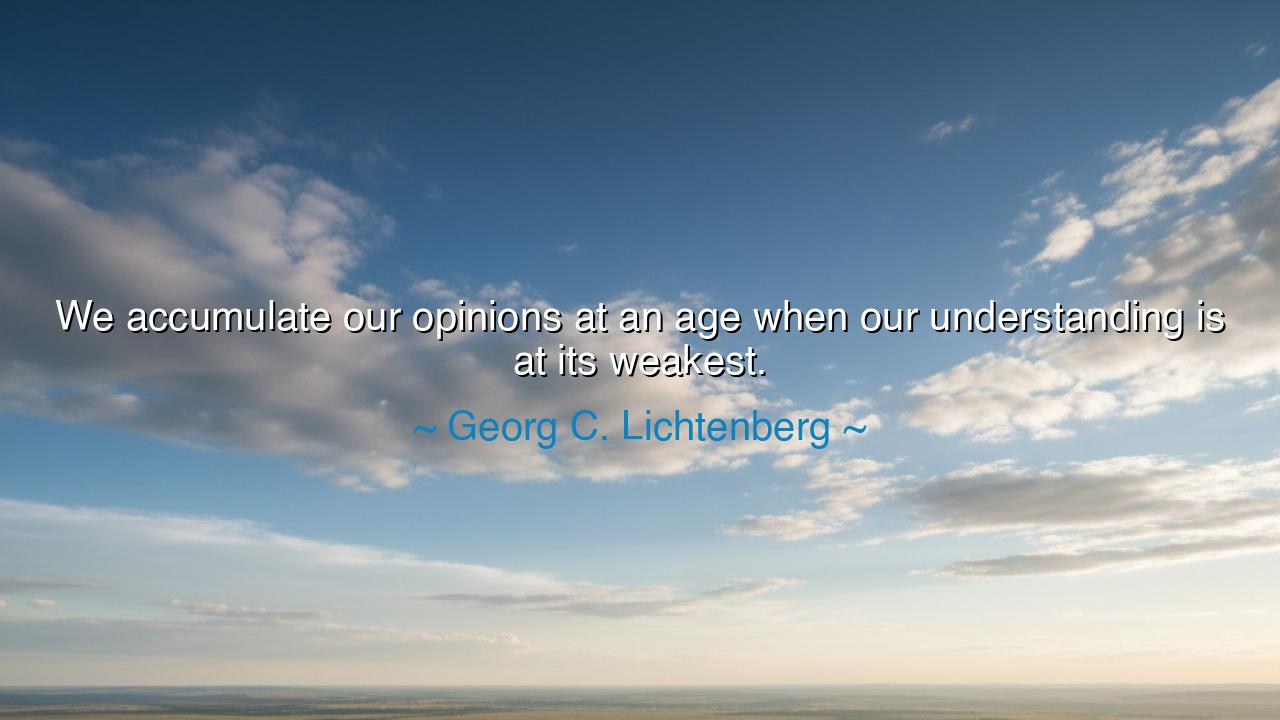
We accumulate our opinions at an age when our understanding is at






“We accumulate our opinions at an age when our understanding is at its weakest.” — Georg C. Lichtenberg
So spoke Georg Christoph Lichtenberg, the German philosopher and satirist whose pen pierced illusion like lightning through fog. His words reveal a truth subtle yet devastating: that the opinions we hold most fiercely are often forged in the immaturity of youth, when passion outweighs wisdom and echo replaces reason. In this saying, Lichtenberg laments the human tendency to gather convictions before we have gathered comprehension—to construct castles of certainty upon the sand of inexperience.
When the mind is young, it is as fertile soil, yet unguarded; every seed that falls takes root. The words of parents, teachers, preachers, and idols become the first voices of belief, and soon these grow into opinions we mistake for our own. But the young heart, though bright, lacks the strength to sift truth from noise. Understanding, that slow and patient builder, has not yet arrived. Thus we collect our doctrines early, like seashells upon the shore, never realizing that many are hollow, and some are already broken.
Consider the story of Galileo Galilei, who in his youth accepted the teachings of Aristotle as the unshakable law of nature. The world was said to be fixed, the heavens perfect, motion divine. But as his understanding deepened, the fragile shell of those opinions cracked beneath the hammer of observation. He looked through his telescope and saw that the heavens themselves were scarred, pitted, imperfect—beautifully human in their design. By daring to outgrow his early certainty, Galileo broke from the prison of inherited thought and entered the freedom of truth. Yet for this courage, he was condemned by those who could not abandon the opinions formed in their own unripe years.
Lichtenberg’s insight speaks not only of the individual but of all humanity. Nations, too, form their beliefs in youth—through myth, conquest, and pride—and spend centuries defending them. How many wars have been fought over ideas adopted before true understanding matured? How many people cling to prejudice, not because it is wise, but because it is familiar? We are born innocent but not wise, and much of life’s labor lies in unlearning what was learned too soon.
Yet this truth, though humbling, need not be bitter. For to recognize the weakness of early understanding is the beginning of wisdom. The wise do not despise their youthful opinions—they examine them, test them, refine them in the fire of reflection. Like gold from ore, true insight emerges only after the dross of assumption is burned away. Lichtenberg calls us, therefore, to a lifelong apprenticeship to truth—to question even that which we have long believed, and to value growth over certainty.
To live by this teaching is to walk the path of humility. Speak your convictions, but wear them lightly. Learn as if you were always wrong, and you will seldom be misled. The opinions you formed in your youth may comfort you, but they are not sacred. For the universe is vast, and truth expands like the heavens themselves—forever beyond full possession. The mature soul does not cling to being right; it clings to being open.
Practical counsel for the seeker:
-
Examine one belief each day and ask, When did I first learn this—and was I yet wise enough to judge it?
-
Seek dialogue with those who differ from you; they are mirrors revealing your blind spots.
-
Let your understanding grow faster than your pride, and your opinions will become gentler, clearer, truer.
-
And remember: certainty is the comfort of the young; wonder is the wisdom of the old.
Thus, the philosopher’s words endure like an ancient warning: guard your mind in youth, and tend it with humility in age. For opinions formed in darkness will shadow a lifetime, but those refined by light will guide generations. As Lichtenberg teaches us—understanding ripens slowly, and wisdom begins where certainty ends.






AAdministratorAdministrator
Welcome, honored guests. Please leave a comment, we will respond soon